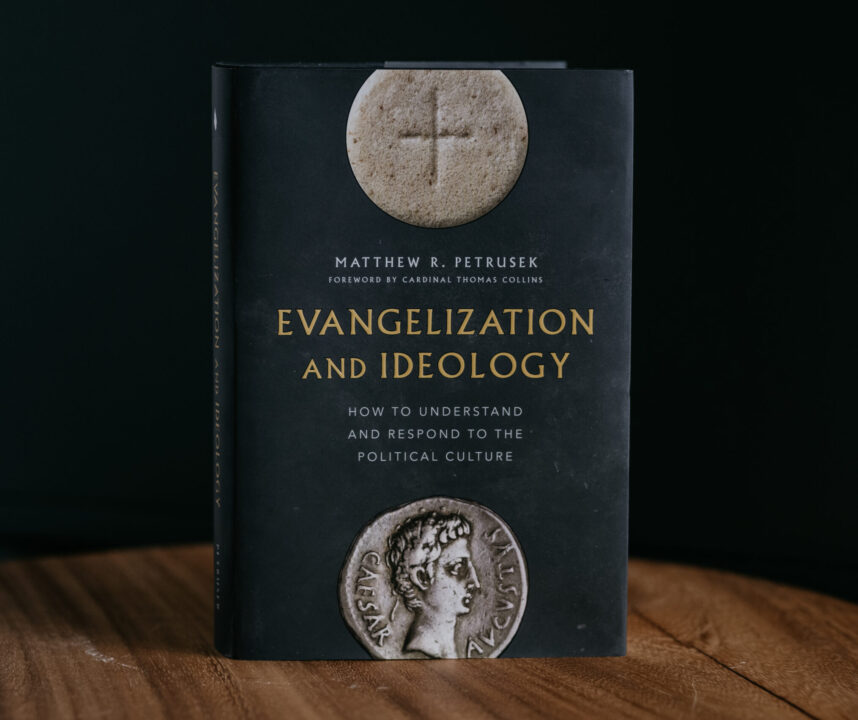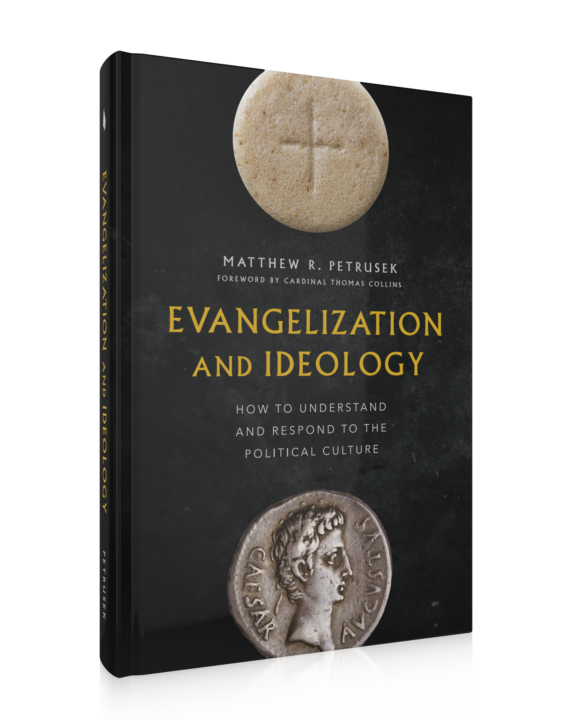
The following excerpt is sourced from the section “Graven Images” in Chapter 5, “Totality without Transcendence: The Anatomy of an Ideology” from Matthew R. Petrusek’s new book Evangelization and Ideology (Word on Fire Publishing).
He offers an understanding of the roots of our broken political culture and a map for redirecting it back to the transcendent God and the authentic human good. You can order the book here with a bonus copy of Bishop Robert Barron’s Arguing Religion.
What is an “ideology”? I’ve already appealed to the term in the examination of the principles of Catholic social thought, highlighting that one of the characteristics that distinguishes Catholic political theory from all secular political theories is that the Catholic view is not an ideology. Here, in this introductory chapter to part II, I want to lay out in more depth exactly what it means to say that a political theory is or is not “ideological.”
Pope St. John Paul II’s critique of sociopolitical systems that deny or otherwise ignore humanity’s relationship to the “mystery of God,” which I cited in the previous chapter, gives us the first clue to what defines an ideology as an ideology—namely, that it provides a totalizing view of reality, including political reality, without reference to the transcendent. The Catechism of the Catholic Church, promulgated by John Paul II, develops this point in greater detail. It states,
Every institution is inspired, at least implicitly, by a vision of man and his destiny, from which it derives the point of reference for its judgment, its hierarchy of values, its line of conduct. Most societies have formed their institutions in the recognition of a certain preeminence of man over things. Only the divinely revealed religion has clearly recognized man’s origin and destiny in God, the Creator and Redeemer. The Church invites political authorities to measure their judgments and decisions against this inspired truth about God and man: Societies not recognizing this vision or rejecting it in the name of their independence from God are brought to seek their criteria and goal in themselves or to borrow them from some ideology. Since they do not admit that one can defend an objective criterion of good and evil, they arrogate to themselves an explicit or implicit totalitarian power over man and his destiny, as history shows.
—Catechism of the Catholic Church 2244 (emphasis added).
The rest of this chapter unpacks and critically evaluates the insight that ideologies, notwithstanding their substantial differences, are, as the Catechism puts it, united in asserting “a certain preeminence of man over things.” In other words, ideologies ground their vision of both what is good and how to achieve that good in something other than God and, as such, relegate all power to govern human life into human hands alone.
Expressed in more formal terms, an ideology is a comprehensive worldview that seeks to describe the sum of reality and to prescribe a systematic moral and political response to reality so described. As such, ideologies aim for descriptive and normative totality—they not only tell you what the world and everything in it is but want to make sure you understand how it all should be as well. It is crucial to add that ideologies establish their totalizing worldviews in one of two ways: they either deny the existence of God altogether (or argue that God’s existence has no bearing on morality and politics) or erase the ontological distinction between God and existence by affirming that God’s presence is or can be fully manifest in a particular moral and political regime (as we see in theocratic forms of government, for example).
If you are living according to an ideology, you are living for a good that is neither grounded in nor oriented toward the transcendent.
Secular ideologies in particular—which are the focus here—possess three additional characteristics. First, all secular ideologies are forms of idolatry, locating the highest human good as existing within the temporal order rather than in the transcendent. Second, all secular ideologies impose unnecessary mutual exclusivities, insisting that we must make zero-sum choices between goods (for example, having to choose equality over freedom) when, in fact, we can coherently unite them under the banner of “both/and.” And third, all secular ideologies either fail to recognize the full depth, perversity, and persistence of human sin or deny the renewing possibilities of authentic moral progress. Let me explain each feature in more detail.
First, idolatry. At first blush, describing secular ideologies as “idolatrous” may sound like an odd approach for engaging in critique. Isn’t idolatry only about “religious stuff”? Doesn’t it mean the worshiping of objects, like representations of Baal or Santa Muerte? What does that have to do with morality, politics, and the social order? In the specific sense, “worshiping” can indeed include acts we typically associate with religiosity, like praying, kneeling, offering sacrifices, giving praise, etc. However, there is a broader definition of “worship” as well: “To worship,” in its most expansive sense, means to live for, to give one’s whole life to, to love above all else. This is the sense of “worship” at play when speaking about ideologies. Remember, one of the fundamental characteristics of an ideology is that it seeks to establish a descriptive and prescriptive totality within a purely temporal horizon. By definition, then, if you are living according to an ideology, you are living for a good that is neither grounded in nor oriented toward the transcendent. Functionally speaking, that’s the same as worshiping an idol—you are organizing your life according to something that is contingent, temporary, and finite. You might as well be prostrating before a graven chunk of stone.
Think, for example, of communist ideology. Its highest good is the establishment and maintenance of the classless society. That’s an idol. Or, on the other side of the spectrum, think of libertarianism; at the heart of libertarian ideology is the belief in the absolute sovereignty of the individual in all affairs in life, only limited by the sovereignty of other individuals. To be a libertarian, then, is to make oneself and one’s own conception of reality and morality the highest good. That’s an idol too. Fascism, in turn, makes an idol of the nation and, usually, its charismatic leader. In a recent mutation of fascism, different strands of identitarianism render race, ethnic group, sexual orientation, or culture into an idol. The secular green movement practices a more old-school idolatry by fashioning the planet itself as the object of worship. The secular humanist movement shifts the idolatrous focus back to the “progress” of humanity but then dissolves into an internecine battle between classical liberals and utilitarians on the meaning of “progress.” In short, there are lots of kinds of ideologies; however, whatever flavor you choose, all of them are ultimately made of the same raw material, a fundamental belief that the purpose of human life is to conform yourself to a reality whose source and summit is in space and time.
We must choose one or the other. We either worship a god, or we worship God.
But again, why call this idolatry? Couldn’t, for example, a libertarian and a communist—bitter ideological enemies—unite in saying they don’t worship anything? That worshiping is only something religious people do and that they are not religious? (Or, even if they are religious, that their politics and their religion have nothing to do with each other?)
This brings us back to the definition of worship and to the recognition that “worshiping” is as much a part of human life as breathing. Everybody, no matter what they believe, must worship something. The logic behind this claim, drawing on St. Thomas Aquinas’ examination of the meaning of happiness in the Summa theologiae, goes like this: All human beings always act for a goal every time they act voluntarily; in other words, what motivates everything we do on purpose is the attainment of some good that we have in mind. Without that, good and purposeful action is unintelligible and impossible. For example, a student goes to class because he wants participation points—that’s the reason he gets up in the morning, gets dressed, swings on his backpack, and gets on the bus. However, as Aquinas notes, every small goal we have, like getting participation points, is subservient to a higher, more inclusive goal—so, for example, the student wants participation points not because he values the points in and of themselves but because he wants a good grade in the class. But, of course, the chain of motivational reasoning doesn’t stop there. The good grade is not desired for itself but for the sake of attaining a high GPA, which, in turn, is not desired for itself but for the sake of becoming valedictorian, which, in turn, is not desired for itself but for the sake of getting into a good college, which is in service of gaining admittance into a top graduate school, which is in service of getting a high-paying job, which is in service of being able to maintain a comfortable lifestyle for him and his family, which is in service of . . . what exactly?
This hypothetical chain of reasoning reveals that whatever we do, we can ultimately trace the reason for it to one dominant goal that both explains every other action we have taken along the way and why we chose one goal over another when they conflicted (for example, choosing to work more hours rather than spending more time with your family). That highest goal, Aquinas argues—the goal in which all our desires finally seek to come to rest or, put differently, a condition that we desire for its own sake—is what we call “happiness,” and every human being, he observes, lives for that.
Yet even if this observation about human nature is true, what does it have to do with “worshiping”? Two things. First, another way of saying that we all have a highest goal in life is to say that we all ultimately give our life to one thing and one thing alone, at least at any given time. The reason is because we cannot, in a literal sense, concurrently pursue two conflicting goals. As noted above, for example, we cannot both work more hours and spend more free time with our family; we cannot both eat whatever we want and be maximally healthy; we cannot both be famous and enjoy the benefits of anonymity; we cannot both seek power at all costs and act morally without exception. One of these objects of desire will have to lose out to the other at any given time when they come into conflict. Moreover, which of the conflicting options we ultimately choose—say, again, electing to work more hours rather than spending time with our children—will tell us not only what we value more in life but, when we trace our desires all the way to their final object, what we value the most. It will tell us, that is, what we live for, which is another way of saying what we worship.

Second, all of us, no matter what specific definition of final happiness we pursue, can ultimately choose only one of two alternatives: We either live for something in the world, for something in space and time—something material, contingent, changeable, and subject to inevitable death and decay, which we could call a “god”—or we live for that which transcends the world and everything in it, that which transcends space and time, a reality that is immaterial, non-contingent, changeless, and eternally alive, which we could, in the language of Aquinas, call “Being itself,” or more colloquially, “God.” Both logically and metaphysically, it’s either one or the other. Either everything we do and every goal we have finds its source and summit in something here—our own life, our family, our political party, our nation, the love of pleasure, etc.—or everything we do finds its source and summit in that which includes temporal reality but also transcends it. Whether a person identifies as “religious” or not, those are the only two options. We cannot not choose, and we must choose one or the other. We either worship a god, or we worship God.
To define secular ideologies as forms of idolatry, therefore, is to recognize that they locate the human good and the means to achieve the good exclusively within a temporal framework. As such, they produce systems of value in which something in the world—either in the form of a temporal object (e.g., the planet) or something of human creation (e.g., the classless society, an ethnic group, a state of mental and physical pleasure)—serves as the purpose of the ideologue’s life. I will develop this point in greater detail in a subsequent chapter, but this characteristic applies to classical liberal and libertarian forms of political thought as well. In their affirmation that all human beings have the right to define “the good” however they choose according to any criteria they choose so long as they respect the rights of others to do the same, liberalism and libertarianism recognize, by default, that there is no ultimate objective good, no objective human happiness. Consequently, they see the good as a subjective human creation—that is, an idol. In sum, by rejecting a theistic grounding and final goal for their (competing) systems of value, secular ideologies may fiercely disagree about which temporal good to bow down to, which god to offer their lives to, but they all agree on one thing: whatever shape the final purpose of human life and human society takes, its basic ingredients are nothing more than earth, water, fire, air, and a dash of human fancy.

There is hope. Our hyper-politicized society is an opportunity for evangelization rather than an obstacle. In this new book, Matthew R. Petrusek analyzes the philosophical foundations of the reigning secular ideologies of our day to show how Catholic teaching responds to their errors and deficiencies by providing a more rational and moral alternative.
You can order Evangelization and Ideology (Word on Fire Publishing) with a bonus copy of Bishop Robert Barron’s Arguing Religion here.
